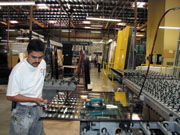
The news is particularly welcome at a time when the availability of polysulfide materials is uncertain, with one of the industry’s primary suppliers exiting the market last year. The higher-performing silicone replacements are expected to relieve supply concerns, reduce callbacks and trim warranty costs versus their organic counterparts. When fully cured, these silicone adhesive/sealants form a weather-resistant secondary IG seal for an insulating glass unit.

An Entire New Market Segment
Further adding to the value of these silicone formulations is the ability of specific materials to function in the high-value structural glazing market, where polysulfides fail to deliver adequate long-term performance. “For manufacturers currently using polysulfide sealants, these silicone materials can open up an entire new market segment,” commented Errol Foster-Davis, account manager for Dow Corning’s Construction OEM Business. “Since OEMs can use the same product for structural glazing applications or conventional glazing, they can sell IG units into either market without changing sealants,” he said.Dow Corning supplies both one- and two-component materials, giving manufacturers the opportunity to further simplify their processes by eliminating secondary catalyst pumps and static mixers through the use of a single-component formulation. With its extensive silicone-handling experience and close working relationship with the industry’s top pump manufacturers, Dow Corning can quickly assist in determining changes to existing dispensing equipment.
Dow Corning(r) 982 Silicone Insulating Glass Sealant is a two-part silicone formulation that is intended for use as a secondary sealant in dual-sealed insulating-glass construction. It offers structural capability and unprimed adhesion to glass and metal substrates, including galvanized steel and aluminum. A primary seal, typically a polyisobutylene mastic, is required to prevent moisture vapor from being transmitted into the air space of the IG unit.
Because it is a consistent, non-slumping material, the sealant is well-suited to automated glazing operations. The formulation is a cost-effective silicone that can also be used as a secondary seal on insulated glass units that will not be structurally glazed. This product offers the cure speed typical of two-part silicone materials and is dispensed with standard equipment.
Dow Corning 982 NSG is a two-component material that combines the advantages of a two-part, rapid-curing silicone insulating-glass sealant with the low cost of a sealant intended for conventionally glazed IG units. By using a common base with the sealant, this material allows the IG manufacturer to switch from structural to non-structural IG units by simply changing the curing agent. This can be a real advantage with trying to optimize an automated production line.
Dow Corning 3-0117 Silicone Insulating Glass Sealant is a single-component material that cures in the presence of atmospheric moisture to produce a durable, high-modulus, flexible rubber seal. This silicone IG formulation is suitable for structural glazing, and the cured seal has been shown to be chemically stable, exhibiting little change in physical properties from weathering. It has demonstrated excellent unprimed adhesion to glass and metals, including galvanized steel, stainless steel and aluminum. With its structural capability and no-mix formulation, this sealant has the potential to open up new markets and applications for OEMs currently using polysulfide materials.
Dow Corning 3-7509 Silicone Insulating Glass Sealant is a one-part formulation that offers a cost-effective solution to polysulfide replacement for manufacturers seeking to combine the greater performance of silicone and the simplified processing of a single-component material. With good unprimed adhesion to uncoated glass and aluminum, this single-component material helps reduce waste and downtime by eliminating the need to purge and maintain static mixers required by two-component products. The consistently non-slumping formulation of this sealant is well suited to automated glazing and offers easy tooling and excellent shelf life. This acetoxy-cure sealant is tack-free in 10 minutes.
Dow Corning develops, manufactures and markets a diverse range of silicon-based materials. Currently offering more than 10,000 products to customers around the world, the company is a global leader in silicon-based technology, with shares equally owned by The Dow Chemical Co. and Corning Inc. More than half of Dow Corning’s sales are outside the United States.
For information on silicone insulating-glass sealants, contact Dow Corning Corp., PO Box 0994 Midland, MI 48686-0994; phone 800-637-5377; fax 989-496-8026; or visit www.dowcorning.com/construction. Or Circle No. 200.
